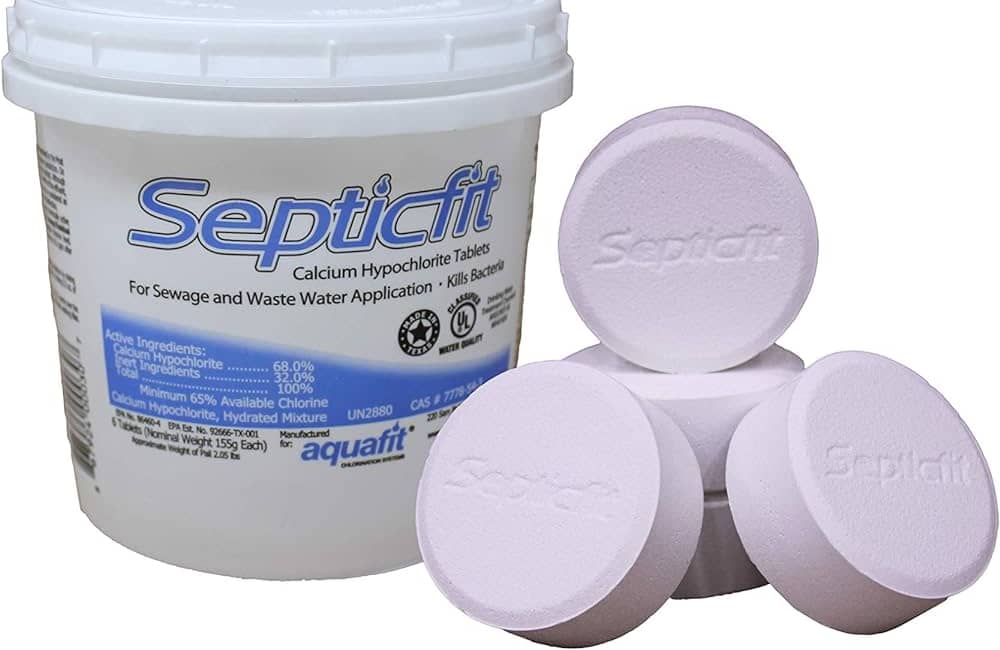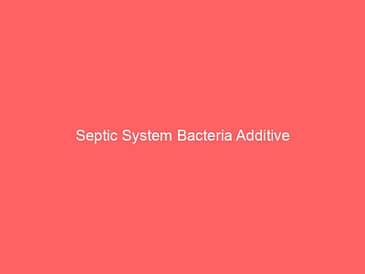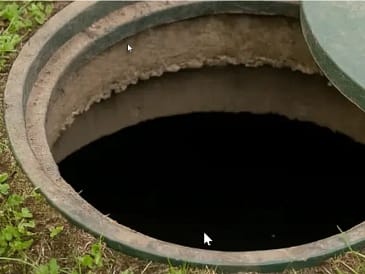Understanding Chlorine Tablets for Septic Tanks
The Importance of Using Chlorine Tablets for Septic Tanks
When it comes to maintaining a healthy septic system, using chlorine tablets can play a crucial role. Septic tanks act as a waste treatment system for homes and businesses that are not connected to a municipal sewage system. These tablets are designed to kill the harmful bacteria present in the septic tank, helping to prevent odors and maintain a well-functioning system.
By using chlorine tablets, you can benefit in the following ways:
- Kills Bacteria: Chlorine is a powerful disinfectant that can effectively kill harmful bacteria, viruses, and other microorganisms that may be present in the septic tank. This helps to prevent the growth of pathogens and reduces the risk of contamination.
- Reduces Odors: One of the primary concerns of a septic system is the unpleasant odor that can arise due to bacterial activity. Chlorine tablets help to eliminate these odors by neutralizing the bacteria responsible for the odor-causing decomposition of waste.
- Improves System Performance: Regular use of chlorine tablets helps to keep the septic tank clean and free from buildup. This improves the overall performance of the system, preventing blockages and backups.
Common Types of Chlorine Tablets for Septic Tanks
There are different types of chlorine tablets available for septic tanks, including:
- Sodium Hypochlorite Tablets: These tablets contain sodium hypochlorite, a form of chlorine, and are commonly used for septic tank disinfection. They are easy to use and dissolve quickly in water.
- Calcium Hypochlorite Tablets: These tablets contain calcium hypochlorite, another effective disinfectant. They have a longer shelf life compared to sodium hypochlorite tablets and are popular for septic systems that require long-term disinfection.
It is essential to carefully follow the manufacturer’s instructions when using chlorine tablets and to avoid overuse, as excessive chlorine can harm the beneficial bacteria that contribute to the proper functioning of the septic system. Regular maintenance and periodic inspection by a professional are also recommended to ensure optimal septic system performance.

Benefits of Using Chlorine Tablets for Septic Tanks
Effective Bacterial Control with Chlorine Tablets
Chlorine tablets are a popular choice for maintaining the health of septic tank systems. These tablets release chlorine into the system, effectively killing harmful bacteria. By controlling bacterial growth, they help prevent clogs, backups, and costly repairs. Regular use of chlorine tablets can significantly extend the lifespan of a septic tank.
Chlorine tablets work by creating an inhospitable environment for bacteria. They kill off the bacteria that break down waste, which can lead to a buildup of solids and a decrease in the tank’s efficiency. The tablets dissolve slowly over time, ensuring a continuous release of chlorine to keep the bacteria in check.
Prevention of Foul Odors with Chlorine Tablets
One of the most unpleasant problems associated with septic tanks is the foul odor that can emanate from them. Chlorine tablets can help eliminate these odors by neutralizing the gases that cause them. The chlorine reacts with the sulfur compounds in the tank, reducing the smell and creating a more pleasant environment.
Additionally, the use of chlorine tablets can help control the growth of algae and other organic matter in the septic tank. This prevents the tank from becoming clogged or overwhelmed by excessive growth, leading to improved overall performance.
In conclusion, using chlorine tablets for septic tanks offers several benefits. They provide effective bacterial control, preventing clogs and backups while extending the lifespan of the system. They also help eliminate foul odors and control the growth of algae and other organic matter. Regular use of these tablets can help ensure a healthy and trouble-free septic tank.
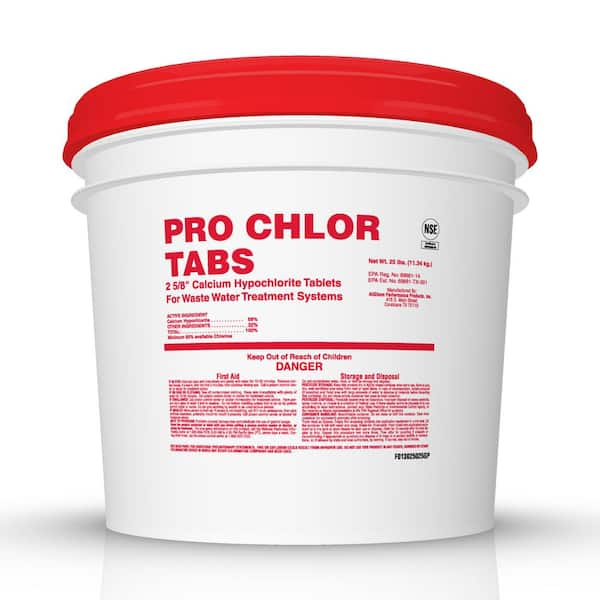
How to Choose the Right Chlorine Tablets for Septic Tanks
When it comes to maintaining a healthy septic system, using the right chlorine tablets is essential. But with so many options available, how do you choose the right ones? Here are some factors to consider when selecting chlorine tablets for your septic tanks.
Factors to Consider When Selecting Chlorine Tablets
- Chemical Composition: Look for tablets that contain the appropriate amount of chlorine to effectively kill bacteria and other harmful organisms in your septic tank. Research the different types of chlorine compounds and their recommended concentrations for septic systems.
- Slow-Release Technology: Opt for tablets with slow-release formulas. These tablets gradually release chlorine, ensuring a continuous supply of sanitizing agents in your septic tank. This helps prevent odors and maintain optimal levels of bacteria.
- Environmental Impact: Consider chlorine tablets that are environmentally friendly. Look for tablets that are labeled as biodegradable or safe for use in septic systems. This helps minimize any negative impact on the environment.
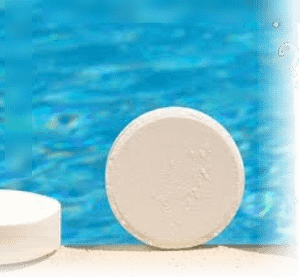
Tips for Properly Using Chlorine Tablets in Septic Systems
- Follow Instructions: Read and follow the instructions provided by the manufacturer carefully. This includes dosage recommendations and the frequency of tablet placement in the septic system.
- Use Appropriate Amounts: Use the recommended amount of chlorine tablets based on the size of your septic tank. Using too little may not effectively clean your system, while using too much can harm the bacteria needed for proper functioning.
- Regular Maintenance: Incorporate the use of chlorine tablets into a regular septic system maintenance routine. This includes pumping the tank every few years and having it inspected by a professional to identify any potential issues.
Choosing the right chlorine tablets and using them properly can help ensure the longevity and effectiveness of your septic system. Always consult with a professional if you have any specific concerns or questions.
Potential Risks and Precautions of Chlorine Tablets for Septic Tanks
Possible Negative Effects of Chlorine on Septic Systems
Septic tank maintenance is important for the proper functioning of your plumbing system. While chlorine tablets are commonly used as a disinfectant, they can have negative effects on septic systems if not used correctly. Here are some potential risks:
- Killing beneficial bacteria: Septic tanks rely on the presence of beneficial bacteria to break down solid waste. Chlorine, if used in excess, can kill these bacteria, disrupting the natural balance in the tank and affecting its efficiency.
- Corrosion of pipes: High levels of chlorine can lead to the corrosion of the pipes and fittings within your septic system. This corrosion can result in leaks, blockages, and costly repairs.
- Environmental impact: Chlorine can be harmful to the environment if it enters groundwater or nearby water bodies. It can also negatively affect the natural balance of ecosystems.
Precautions to Take When Using Chlorine Tablets
To minimize the potential risks associated with using chlorine tablets for septic tanks, here are some precautions to consider:
- Follow dosage instructions: Be sure to follow the recommended dosage instructions provided by the manufacturer. Using too much chlorine can be detrimental to your septic system.
- Use septic-safe products: Choose chlorine tablets specifically designed for septic systems. These products are formulated to be safe for the bacteria in your tank.
- Maintain regular pumping and inspection: Regularly pumping your septic tank and having it inspected by a professional can help ensure its proper functioning.
- Consider alternative disinfectants: If you’re concerned about the potential risks of chlorine, there are alternative disinfectants available, such as hydrogen peroxide or vinegar, that can be used in septic systems.
By understanding the potential risks and taking proper precautions, you can safely use chlorine tablets for septic tanks while maintaining a well-functioning plumbing system.
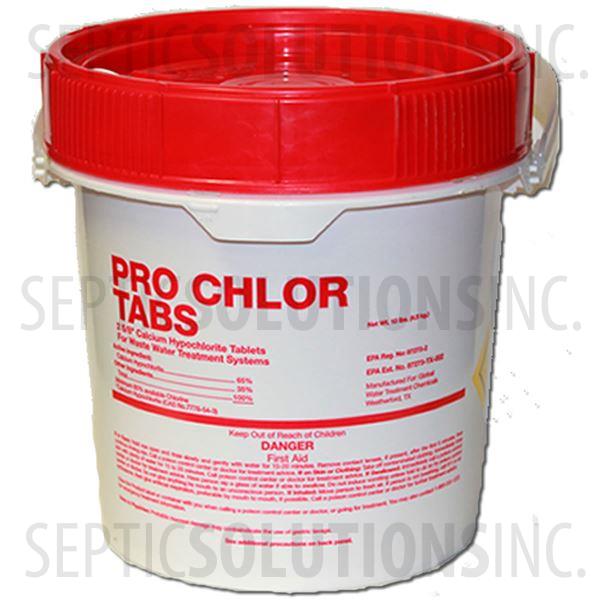
Alternative Options to Chlorine Tablets for Septic Tanks
Septic tanks are an essential part of many homes and businesses, helping to treat and dispose of wastewater in an efficient and environmentally friendly manner. Traditionally, chlorine tablets have been a popular choice for treating septic tanks, but there are alternative options available that may be more eco-friendly and effective.
Eco-Friendly Alternatives to Chlorine Tablets
- Enzyme-Based Treatments: Enzyme-based treatments use naturally occurring bacteria and enzymes to break down organic waste in septic tanks. These treatments are safe for the environment and can help to maintain the balance of bacteria in the tank.
- Oxygen-Based Treatments: Oxygen-based treatments use oxygen-releasing compounds to promote the growth of aerobic bacteria in septic tanks. These bacteria are more efficient at breaking down waste than anaerobic bacteria, resulting in better odor control and improved system performance.
- Biodegradable Cleaners: Using biodegradable cleaners in your home or business can also contribute to a healthier septic system. Harsh chemicals found in many conventional cleaners can disrupt the delicate balance of bacteria in the tank, leading to potential issues.
Comparing Different Septic Tank Treatment Methods
When considering alternative options to chlorine tablets, it’s important to compare different treatment methods based on effectiveness, environmental impact, and cost. Factors to consider include:
- Effectiveness: How well does the treatment break down waste and prevent odors?
- Environmental Impact: Does the treatment use natural, eco-friendly ingredients?
- Cost: Is the treatment cost-effective in the long run compared to chlorine tablets?
By exploring these alternative options and considering their benefits and drawbacks, you can choose the most suitable treatment method for your septic tank that aligns with your values and budget. Remember to consult with a professional if you have any specific concerns or questions about your septic system.

Conclusion
In conclusion, using chlorine tablets for septic tanks can be an effective solution for maintaining a healthy and functional system. These tablets offer a convenient and efficient way to control bacterial growth and prevent clogs and odors. However, it is important to use them properly and consider potential drawbacks such as environmental impact and the need for regular maintenance.
Summary of the Benefits and Considerations of Using Chlorine Tablets for Septic Tanks
Using chlorine tablets in septic tanks has several benefits, including:
- Effective Bacterial Control: Chlorine tablets help prevent bacterial overgrowth, maintaining a healthy balance in your septic system.
- Clog Prevention: By controlling bacterial growth, these tablets reduce the risk of clogs and blockages.
- Odor Reduction: Chlorine tablets can help minimize unpleasant odors associated with septic tanks.
However, there are also some considerations to keep in mind:
- Environmental Impact: Chlorine can have adverse effects on the environment, so it is important to use chlorine tablets responsibly and follow the recommended dosage.
- Regular Maintenance: Chlorine tablets are not a one-time solution. Regular maintenance, such as pumping the septic tank, is still necessary to ensure optimal performance.
Frequently Asked Questions about Chlorine Tablets for Septic Tanks
- Are chlorine tablets safe to use in septic systems?
- When used according to the instructions, chlorine tablets are generally safe for use in septic systems. However, it is important to follow the recommended dosage and avoid overuse.
- How often should I use chlorine tablets in my septic tank?
- The frequency of use depends on factors such as the size of your tank and the number of occupants in your property. It is best to consult with a professional to determine the appropriate usage schedule for your specific septic system.
- Can chlorine tablets replace regular septic tank maintenance?
- No, chlorine tablets should not replace regular septic tank maintenance. Routine maintenance, such as pumping the tank, is still necessary to ensure the longevity and proper functioning of your septic system.
